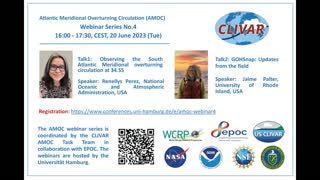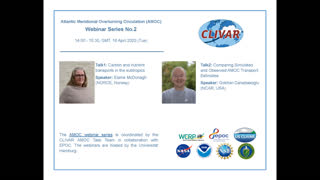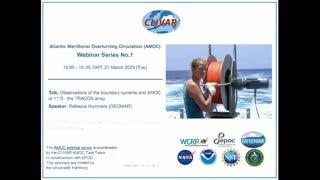Recent observational advances from the South Atlantic Meridional Overturning Circulation (SAMOC) initiative & GOHSnap: Updates from the field - PhD. Renellys Perez, Prof. Jaime Palter - Universität Hamburg
- Lecture2Go
- Videokatalog
- F.6 - Mathematik, Informatik, Naturwissenschaften
- Sonstiges
- AMOC Webinar Series
Videokatalog
2180 Aufrufe
20.06.2023
Recent observational advances from the South Atlantic Meridional Overturning Circulation (SAMOC) initiative & GOHSnap: Updates from the field
Title: Recent observational advances from the South Atlantic Meridional Overturning Circulation (SAMOC) initiative
Speaker: Renellys Perez (NOAA, USA)
Abstract:
The South Atlantic is a key gateway for water mass and property exchanges between the Atlantic and other basins, and is thus a crucial place to measure changes in the Atlantic Meridional Overturning Circulation (AMOC). The international South Atlantic Meridional Overturning Circulation (SAMOC) initiative has made numerous advances in observing the variability of heat, fresh-water, and volume (mass) transports by the AMOC in the South Atlantic, as well as studying their connection to interocean exchanges, over the past fifteen years. Moored arrays established in the tropical and subtropical South Atlantic have been transformative for AMOC science, providing continuous daily observations of AMOC, as well as interior and abyssal transport pathways. Recent hydrographic sections provide exciting results about the interplay between eddies and volume, heat, and fresh-water transports by AMOC. Multi-decadal satellite-based products and blended satellite-in situ products provide new information about the connectivity between AMOC variations in the South and North Atlantic, and provide opportunities for cross-validation of mooring-based AMOC observations. SAMOC observations are being used to validate and inform improvements to state-of-the-art numerical models, so that models can improve and provide better insights on the dynamical mechanisms driving AMOC variations in the South Atlantic. As SAMOC data records become longer and new observations coming online, we anticipate that their use by the community will increase spurring new research advancements. During this presentation, we will summarize key findings from ongoing SAMOC observing efforts, and describe expansions to the SAMOC observing system, and discuss some ways in which the observing system might evolve in the future.
Title: GOHSnap: Updates from the field
Speaker: Jaime Palter (University of Rhode Island, USA)
Abstract:
Over the last century, the ocean has become steadily more depleted in oxygen while also absorbing about 25% of the anthropogenic carbon dioxide added to the atmosphere each year. Therefore, observing gas uptake and transport processes is essential for understanding and predicting the evolution of the ocean and climate system. While it is often assumed that a slowdown in the AMOC will lead to deoxygenation of the deep ocean and a decrease in the uptake and storage of carbon, we have never had observations sufficient to test these assumptions. In this talk, I will describe a collaborative project called Gases in the Overturning and Horizontal circulation of the Subpolar North Atlantic Program (GOHSNAP), in which we deployed oxygen sensors over the full depth of OSNAP moorings in the Labrador Current and on both sides of Cape Farewell, Greenland, and pCO2 sensors at few key locations near the ocean's surface. We are using these additions to the moored array to investigate the rates and processes governing gas exchange and separate the role of the overturning and horizontal circulation on the export of gases from the Labrador Sea. The first gas sensor data from this program was recovered in summer of 2022, so the emphasis of this talk will be on the hydrographic data that led to GOHSNAP's hypotheses, tips and tricks for collecting oxygen data on moorings, and a sneak peek of preliminary results.
---
The AMOC ( Atlantic Meridional Overturning Circulation) Webinar Series gives an overview and assessments of the current AMOC observing systems. Overview: https://www.clivar.org/amoc-webinar-series Workshop on Meeting AMOC Observation Needs in a Changing Climate: https://www.clivar.org/events/workshop-meeting-... The AMOC Webinar Series is organised by the CLIVAR AMOC Task Team in collaboration with the EU-Project EPOC, coordinated at the UHH.
---
The AMOC ( Atlantic Meridional Overturning Circulation) Webinar Series gives an overview and assessments of the current AMOC observing systems. Overview: https://www.clivar.org/amoc-webinar-series Workshop on Meeting AMOC Observation Needs in a Changing Climate: https://www.clivar.org/events/workshop-meeting-... The AMOC Webinar Series is organised by the CLIVAR AMOC Task Team in collaboration with the EU-Project EPOC, coordinated at the UHH.
Technischer Support
Bitte klicken Sie auf den nachfolgenden Link und füllen Sie daraufhin die notwendigen Felder aus, um unser Support-Team zu kontaktieren!
Link zu der RRZ-Support-Seite




